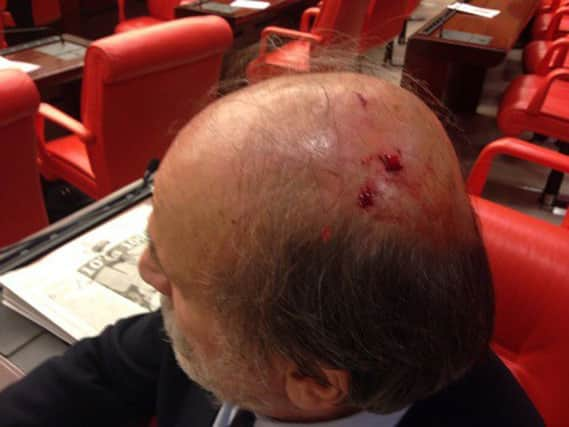Turkish parliament erupts in brawl


Now the fight over a new security bill has forced the spotlight on mounting suspicions that president Recep Tayyip Erdogan’s real goal is to hand himself more tools to crush dissent.
Five lawmakers were injured in the fight that broke out as opposition leaders tried to delay a debate on the legislation.
Advertisement
Hide AdAdvertisement
Hide AdThe government says the measures to give police extra powers to break up demonstrations are aimed at preventing violence such as the deadly clashes that broke out last year between Kurds, supporters of an Islamist group and police.
Critics say that the measures are part of a steady march toward preventing demonstrations that threaten Mr Erdogan’s iron grip over Turkish politics.
The bill would expand police rights to use firearms, allow them to search people or vehicles without a court order and detain people for up to 48 hours without prosecutor authorisation. Police would also be permitted to use firearms against demonstrators who hurl Molotov cocktails. Demonstrators who cover their faces with masks or scarves during violent demonstrations could face four years in prison.
Crucially, the measures would give governors, not just prosecutors and judges, the right to order arrests.
Mr Erdogan said they were “aimed at protecting social order and social peace.” Prime minister Ahmet Davutoglu dismissed accusations that the measures will violate civil liberties, saying the goal is to protect society: “No-one will be able to demonstrate with Molotov cocktails,” he said.
Metin Feyzioglu, head of the Turkish bar association, said giving local governors powers to order arrests without court orders is tantamount to martial law. “This is an extremely dangerous development,” he said.
In recent years, Turkey has curbed media freedoms, cracked down on critical social media postings and prosecuted hundreds of people who took part in violent mass protests against the government in 2013 that centred on Istanbul’s Taksim Gezi Square. In one case, Turkish prosecutors are seeking possible jail time for a former television presenter who posted a tweet suggesting a cover-up in a government corruption scandal.
A Turkish schoolboy was also charged for publicly criticising Mr Erdogan over the scandal – falling afoul of a law against insulting the president.
Advertisement
Hide AdAdvertisement
Hide Ad“Erdogan is aware that he is not going to be able to achieve his goals through purely democratic means,” said Gareth Jenkins, an Istanbul-based analyst with the Institute for Security and Development Policy. “If you are trying to stop people from expressing their opinions, it is a sign that you are not accountable.”
The government has also extended its crackdown to sporting events, mindful of the big role that soccer fans from some Istanbul teams played in the Gezi protests.